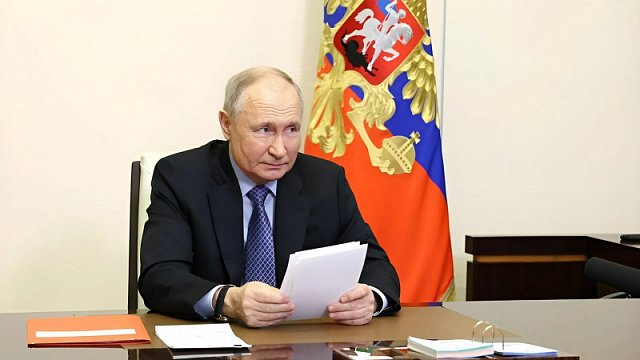08.05.24
14:17
Vladimir Putin defines national goals and development prospects until 2036
The presidential decree came into force on 7 May and cancelled a similar document dated 21 July 2020
On the day of his inauguration, Russian President Vladimir Putin signed a decree “On the national development goals of the Russian Federation for the period until 2030 and in the perspective until 2036”. Among these goals are named:
preservation of the population, improvement of health and well-being of people, support for the family;
realising the potential of each individual, developing his or her talents, and fostering a patriotic and socially responsible personality;
comfortable and safe living environment;
ecological well-being;
sustainable and dynamic economy;
technological leadership;
digital transformation of state and municipal administration, economy and social sphere.
The head of state indicated to increase the birth rate to 1.6 by 2030 and to 1.8 by 2036. The document reflects the goal to increase life expectancy to 78 years by 2030 and 81 years by 2036.
By 2030 it is necessary to create conditions for the education of a ‘patriotic and socially responsible personality’ and to increase the number of foreign students in Russian universities to at least 500,000.
The President has instructed to improve the environment in supportive settlements and renovate the housing stock. The document stipulates the goal of providing citizens with housing with an area of at least 33 square metres by 2030 and at least 38 square metres by 2036.
According to the decree, it is necessary to halve the level of harmful atmospheric emissions in particularly polluted cities by 2036. A closed cycle of sorting 100 per cent of solid municipal waste must be established by 2030. By the end of 2030, the country’s authorities are ordered to eliminate at least 50 dangerous objects of accumulated environmental damage.
No later than 2030, Russia must reach the fourth place in terms of GDP growth (calculated at purchasing power parity), reduce the share of imported goods and services in the GDP structure to 17 per cent, and increase investment in fixed capital by at least 60 per cent compared to the level of 2020.
The decree envisages growth of stock market capitalisation to at least 66 per cent of GDP by 2030 and 75 per cent by 2036. The share of long-term savings of citizens in the total volume should grow to 40 per cent by 2030 and to 45 per cent by 2036.
The document outlines the need to ensure technological independence and the formation of new markets, Russia’s entry by 2030 into the top 10 leading countries in the world in terms of research and development. In addition, it envisages the achievement of ‘digital maturity’ of state and municipal administration and the introduction of machine learning and artificial intelligence technologies by 2030.
At least 80 per cent of Russian organisations should switch to domestic software, and up to 95 per cent in government agencies. By 2030, according to the decree, Russia should be among the world’s top 25 countries in terms of robotisation density.
Photo:
kremlin.ru
Back

